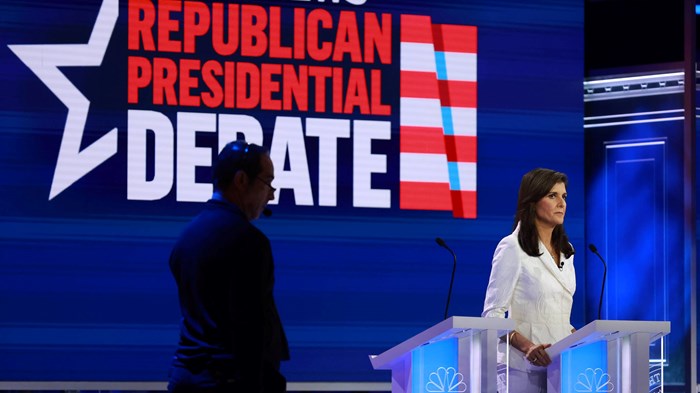
In the first debate since war erupted in the Middle East, candidates in the third GOP presidential primary debate spent over an hour addressing the conflict and coming to Israel’s defense.
Israel has become a flashpoint in the campaign over the past month, with Republican presidential candidates mostly seeking to outdo their rivals in showing support for the Jewish state.
For many evangelical voters, “Israel is non-negotiable. There is a reflexive support of Israel,” Mark Caleb Smith, a political science professor at Cedarville University, told Christianity Today. “So I’d be surprised if that fractures.”
The United States must “support Israel with whatever they need, whenever they need it,” said former ambassador to the United Nations Nikki Haley, who is vying for second place in the polls. Haley argued Israel is a strategic ally in the region for the United States when it comes to countering the influence of Iran and is the “tip of the spear when it comes to Islamic terrorism.”
Throughout her campaign, Haley has been intentional in wooing prominent Christian Zionists. The launch of her presidential campaign in February featured Texas megachurch pastor and televangelist John Hagee, founder of Christians United for Israel, who gave an invocation prayer. Hagee endorsed Trump in 2016 but has yet to endorse a candidate this cycle. His group has sent over $1 million in relief to Israel following the October 7 attack.
On Wednesday, Haley distanced herself from the Biden administration’s recent calls for a humanitarian pause in the fighting. “The last thing we need to do is to tell Israel what to do,” she said. “The only thing we should be doing is supporting them in eliminating Hamas.”
Haley also called out college administrators for failing to take antisemitism seriously. “If the KKK were doing this, every college president would be up in arms,” she said. “Antisemitism is no different—it’s just as bad as racism.”
Joel Rosenberg, a Jewish evangelical involved with the Trump administration’s Abraham Accords efforts and founder of The Joshua Fund, a pro-Israel Christian group, posted in response to Haley’s line that “every candidate should be saying this.”
Many US evangelicals cite theological reasons for backing Israel’s right to its land and to defend itself. In a 2017 Lifeway Research survey, over half of evangelicals said the Bible has shaped their views of Israel, and just 7 percent say elected officials influence their stance. At the time, 31 percent said the US does enough to help Israel and another 24 percent wanted to see more support.
The discussion on international affairs may be a further boost for Haley. She received plaudits from political analysts post-debate for the ease with which she leaned into her foreign policy chops.
Florida Gov. Ron DeSantis, who has at times expressed more of an isolationist bent when it comes to the United States’ involvement abroad, adopted a strident tone when it came to the conflict, calling for Israeli prime minister Benjamin Netanyahu to “finish the job once and for all with these butchers, Hamas.”
DeSantis also highlighted that his support for Israel was more than just rhetoric. He’s authorized the state of Florida to fly home hundreds of Americans evacuated from Israel; ordered state universities to disband chapters of Students for Justice in Palestine, a pro-Palestinian student organization; and sent cargo planes with drones, body armor, and other unspecified amounts of weapons and ammunition to Israel.
He said he’d continue that crackdown on campuses that receive federal funding and have instances of antisemitism: “We’re not going to use tax dollars to fund jihad,” he said. He also derided the Biden administration for its recently launched initiative to counter Islamophobia.
Entrepreneur Vivek Ramaswamy, the most staunchly isolationist voice on stage, said that Israel should defend itself but the United States must be “careful to avoid making the mistakes from the neocon establishment of the past,” and he criticized US involvement in Afghanistan and Iraq.
Ramaswamy denounced antisemitism but said students at pro-Palestinian rallies were uninformed: They “have no idea what the heck they’re even talking about.” He argued against any form of censorship of student activities, saying that “creates a worse underbelly.”
Former New Jersey governor Chris Christie said his message to Israel was that “America is here, no matter what it is you need.” He was the sole candidate to be asked about Islamophobia. Christie said he’d addressed hate crimes against both Jewish Americans and Muslim Americans as a US attorney in his state.
“Wipe Hamas off the map,” Sen. Tim Scott, a South Carolina Republican, said. “You cannot negotiate with evil.”
On social media, Scott noted he had invited a group of Jewish students to attend the debate. And during the debate, he said universities that don’t do enough to combat antisemitism should lose federal funding. He also called for students here in the United States on visas to be deported if they were found to be “encouraging Jewish genocide.”
Scott also continued to make the most obvious overtures to conservative religious voters and referenced the Bible in both his opening and closing statements. “It is the loss of faith in this nation that is a part of the erosion we’re seeing every single day,” he said early on in the debate. “It is restoring faith, restoring Christian values that will help this nation once again become this city on a hill. When Ronald Reagan talked about a city on a hill, it was coming from Matthew 5.”
The reference to one of the themes of Reagan’s presidency comes from Matthew 5:14, “You are the light of the world. A city that is set on a hill cannot be hidden” (New King James Version).
At the close of the debate, Scott said, “I do not want to win the battle against Joe Biden. I want to win the war for Christian conservative values.”
The party’s front-runner from the debate, former president Donald Trump, was again absent. At a rally last month, though, Trump sought to highlight his record on the Middle East, saying, “I can’t imagine how anybody who’s Jewish or anybody who loves Israel—and frankly, the evangelicals just love Israel—I can’t imagine anybody voting Democrat.”
On Wednesday, Trump hosted a big political rally at Hialeah, a majority Latino city outside Miami. As part of his strategy to make inroads with Latino voters, Trump sought to court religious voters by going on the attack and accusing Biden, a lifelong Catholic, and the Democratic party of going “after Catholics.”
“Any Catholic or Christian that votes for a Democrat, I have to say, they’re fools,” he added.
The fourth Republican presidential primary debate will take place on December 6 in Tuscaloosa, Alabama.

Support Our Work
Subscribe to CT for less than $4.25/month


















